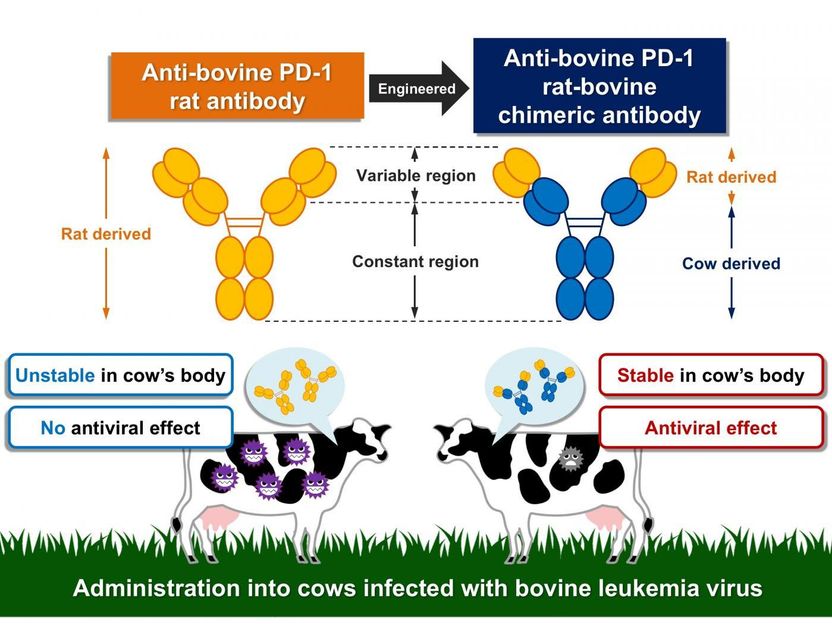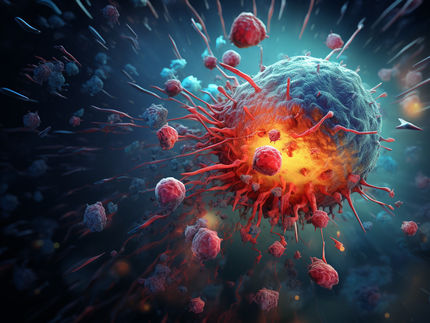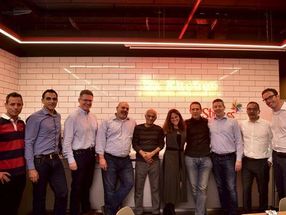Overcoming immune suppression to fight against bovine leukemia
Bovine leukemia is a systemic, malignant lymphosarcoma in cows which is mainly caused by infection with a retrovirus, bovine leukemia virus (BLV). In 2016, 3,125 cases of bovine leukemia were reported in Japan, which was the largest number of cases among the infectious bovine diseases designated by the Act on Domestic Animal infectious diseases Control. Bovine leukemia is commonly seen in other Asian countries, South America and North America.

The anti-bovine PD-1 rat antibody (left) was found unstable in the cow's body and had no antiviral effect. So, the research team formed a rat-bovine chimeric antibody (right) which successfully showed an antiviral effect.
Satoru Konnai, Hokkaido University
About 35 percent of cows in Japan have been reportedly infected with BLV. Although the rampant infection has caused a considerable economic loss to dairy and beef farmers, there has been no effective vaccine or treatment available to control the spread and progression of the disease.
In a previous study, scientists from Hokkaido University, Tohoku University and the Hokkaido Research Organization found that the lymphocytes called T-cells are functionally suppressed by a receptor/ligand interaction between PD-1 and PD-L1 while infected with BLV. The immune suppression was closely related to progression of the disease. Furthermore, they developed an anti-PD-L1 antibody which was found effective in blocking PD-1/PD-L1 interaction and reinvigorating T-cell response in the infected cows.
In the current study, the research team developed an anti-PD-1 antibody derived from rats. They then tested its effectiveness on a cow in preventing progression of the disease. However, no significant improvement in T-cell activity or the virus count was found, apparently due to the antibody instability in the cow's body when administrated.
The team then engineered the anti-PD-1 rat antibody to form an anti PD-1 "rat-bovine" chimeric antibody, which was again administered to the infected cow. They discovered the newly developed antibody blocks the binding between PD-1 and PD-L1, reinvigorating the antivirus immune response and thus decreasing the virus count in the infected cow. Furthermore, the antibody is not easily expelled from the cow's body, enabling it to remain effective within the cow for a longer period.
"The new antibody could pave the way for developing biomedicines that effectively treat cows infected with the bovine leukemia virus. Such biomedicines are also expected to reduce the use of antibiotics or steroids in other intractable infectious diseases," says Associate Professor Satoru Konnai of the research team at Hokkaido University. "We plan to conduct animal experiments this year to verify if our antibodies are effective in treating other diseases."
Original publication
Okagawa, Tomohiro and Konnai, Satoru and Nishimori, Asami and Maekawa, Naoya and Ikebuchi, Ryoyo and Goto, Shinya and Nakajima, Chie and Kohara, Junko and Ogasawara, Satoshi and Kato, Yukinari and Suzuki, Yasuhiko and Murata, Shiro and Ohashi, Kazuhiko; "Anti-Bovine Programmed Death-1 Rat–Bovine Chimeric Antibody for Immunotherapy of Bovine Leukemia Virus Infection in Cattle"; Frontiers in Immunology; 2017
Other news from the department science
Most read news
More news from our other portals
See the theme worlds for related content
Topic world Antibodies
Antibodies are specialized molecules of our immune system that can specifically recognize and neutralize pathogens or foreign substances. Antibody research in biotech and pharma has recognized this natural defense potential and is working intensively to make it therapeutically useful. From monoclonal antibodies used against cancer or autoimmune diseases to antibody-drug conjugates that specifically transport drugs to disease cells - the possibilities are enormous

Topic world Antibodies
Antibodies are specialized molecules of our immune system that can specifically recognize and neutralize pathogens or foreign substances. Antibody research in biotech and pharma has recognized this natural defense potential and is working intensively to make it therapeutically useful. From monoclonal antibodies used against cancer or autoimmune diseases to antibody-drug conjugates that specifically transport drugs to disease cells - the possibilities are enormous





















































